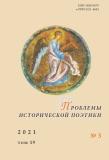Латинская афористика в поэтике Ф. М. Достоевского
Latin Aphoristics in the Poetics of F. M. Dostoevsky
Author(s): Anna Aleksandrovna SkoropadskayaSubject(s): Media studies, Russian Literature, 19th Century, Philology, Theory of Literature
Published by: Петрозаводский государственный университет
Keywords: F. M. Dostoevsky; Latin; quotation; aphorism; idiostyle; author’s thesaurus;
Summary/Abstract: The article analyzes the role of Latinisms in the literary and journalistic texts of F. M. Dostoevsky. By virtue of his education, the writer was wellacquainted with Latin literature, which undoubtedly affected his poetics. Multilingualism becomes one of the polyphonic tools of the latter: combination of languages performs a characterological function, enriching the characters’ speech portrait and expanding the linguocultural context of their worldview. Latin quotations are either provided by Dostoevsky as independent sentences, or integrated into the text and adjusted to the Russian syntax and grammar. Truncated or modified aphorisms integrated in the characters’ words are an attempt to substantiate their beliefs through an appeal to cultural constants. Most often, a change of this sort takes on a parodic character and turns into an alteration of meanings and a denial of spiritual values. Expressions from the Catholic culture occupy a special place in Dostoevsky’s poetics. On the one hand, Latin Catholic names complement the figurative embodiment of the Christian faith. On the other hand, while being the object of irony, ridicule or criticism, for Dostoevsky church Latin formulas illustrate an important topic in Roman Catholic Christianity: using the example of the so-called “Roman question,” the writer develops the idea of the life and death of religion in Europe.
Journal: Проблемы исторической поэтики
- Issue Year: 19/2021
- Issue No: 3
- Page Range: 131-149
- Page Count: 19
- Language: Russian

